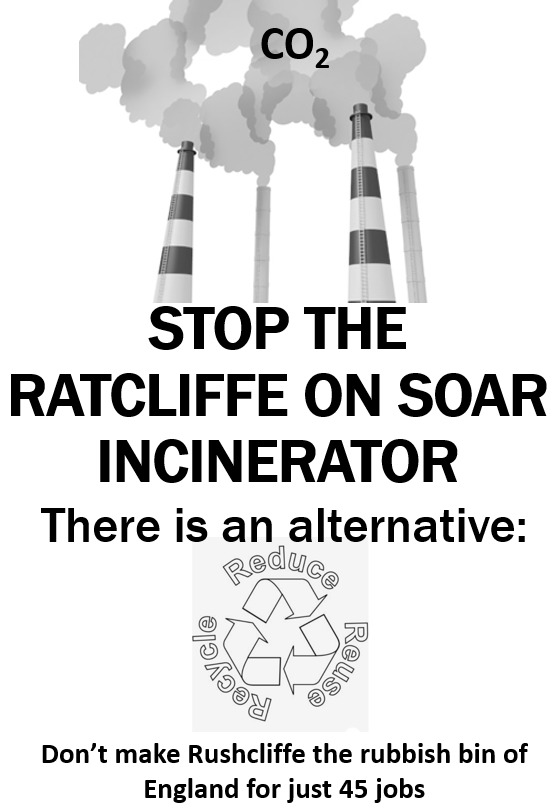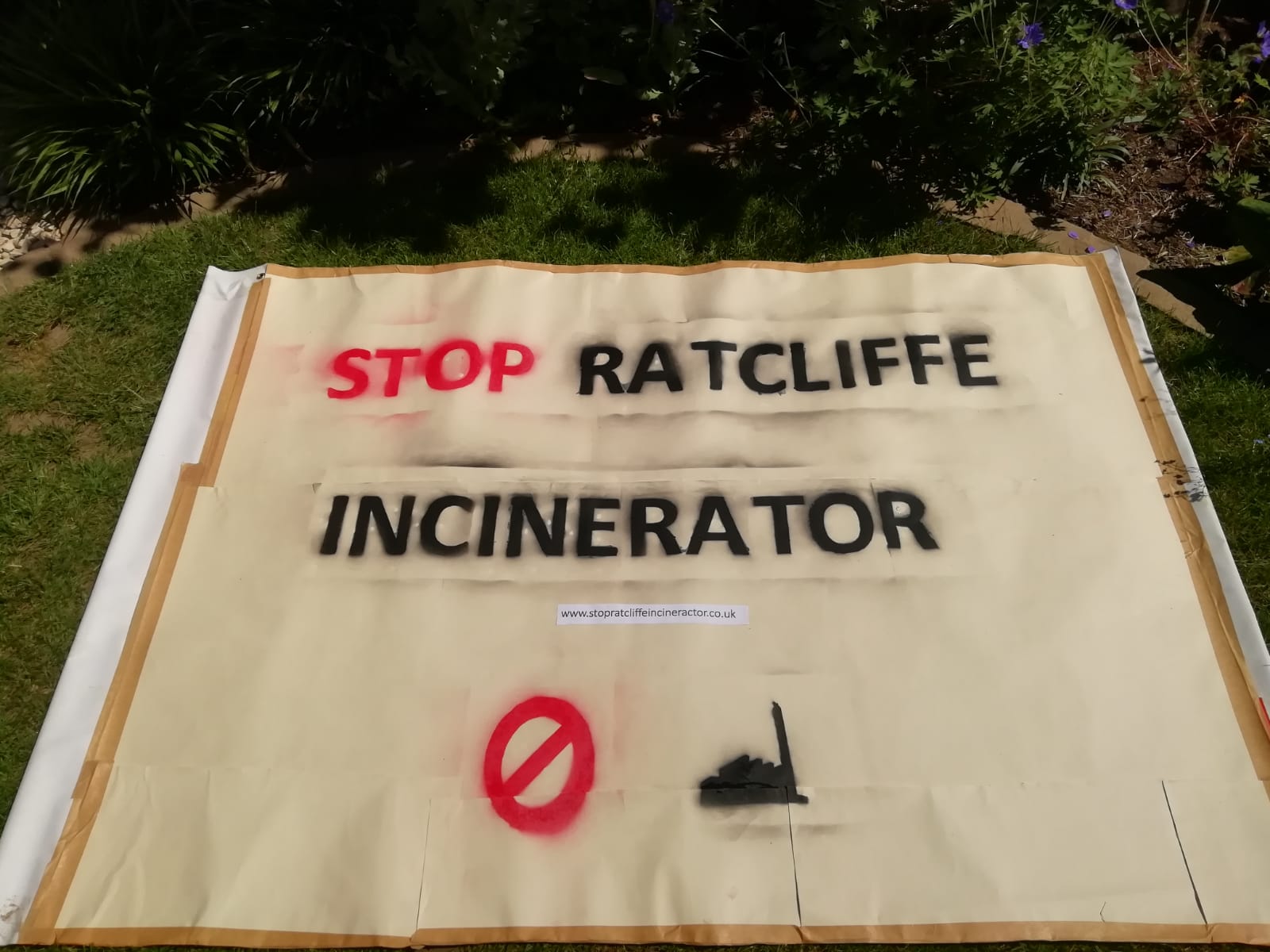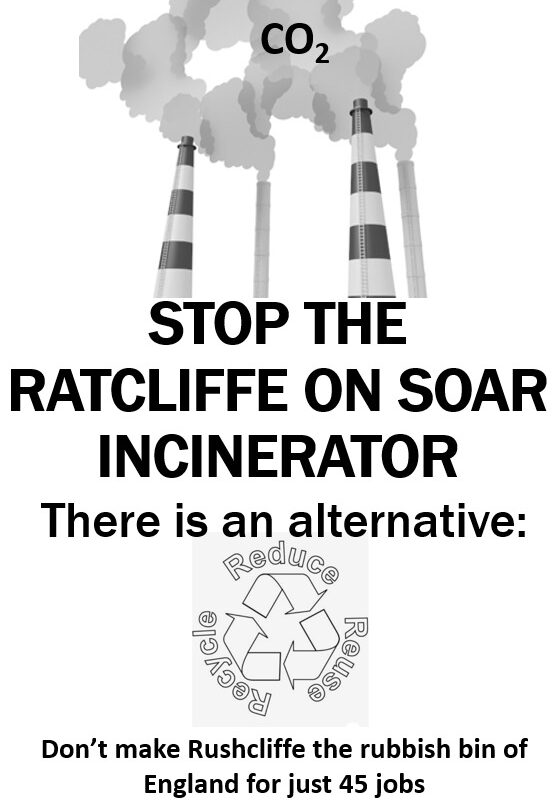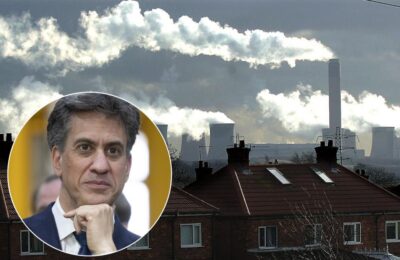This article by members of West Bridgford Labour Party explains their opposition to the proposed incinerator at Ratcliffe On Soar.
Below it you will find a motion passed by the branch and Rushcliffe CLP in June.
Since then the CLP has delivered 18,000 leaflets in Rushcliffe opposing the incinerator and the campaign has been supported by the Green Party and XR Nottingham.
www.stopratcliffeincinerator.co.uk

Incinerators often deliver lower levels of electricity generation and release higher levels of fossil CO2 emissions, resulting in higher carbon intensity than claimed by those promoting incineration schemes.
Incineration is marketed as an environmentally-friendly alternative to landfill, but many environmentalists and experts place incineration alongside landfill as something from which we need to move away due to the adverse climate impacts of waste incineration, especially as we move towards a Net Zero circular economy.
Josh Dowen, Associate Coordinator of the United Kingdom Without Incineration Network (UKWIN), says: “Building new incinerators costs hundreds of millions of pounds, locking us into burning waste for decades to come. It is therefore essential that those assessing proposals for new incineration capacity take account of the full climate impacts and opportunity costs.”
Camilla Zerr, Plastics campaigner at Friends of the Earth said: “Plastic is one of the main materials sent to incinerators, creating significant quantities of climate-wrecking carbon dioxide when burnt. And because incinerators need huge quantities of waste to keep them going, there is little incentive to reduce the amount created in the first place.”
We say that we need to assess any planning application for Energy from Waste to account for the climate harm being caused by waste incineration, strengthening the case for turning off the plastic tap. A joined-up approach to the waste crisis is urgently needed, including legally-binding targets to reduce the amount of plastic created each year.”
The Stop Ratcliffe Incinerator Campaign has brought local people concerned about the Greenhouse gas emissions we will be living with till 2050 from this incinerator, without any plans for carbon dioxide capture (CCUS) fitted and with no plans for use of the heat energy it produces; unlike the other local Eastcroft incinerator which heats homes in parts of St Anne’s and the Victoria Centre shops and flats.
We know that similar projects have been turned down at inquiries by the Secretary of State and so we have asked for a similar inquiry be instigated here in Nottingham.
Research shows energy from incinerators is more carbon intense
than predicted at planning stage
Electricity from incinerators is worse than gas (CCGT) or renewables and so
energy from waste incineration should not be described as ‘low carbon’
We have plenty of experts and decisions on our side against the multinational corporates behind the over twenty new Energy from Waste incinerators in the pipeline today of which the UNIPER EMERGE Application is one.
Some notes from UKWIN re: https://www.theccc.org.uk/publication/2021-progress-report-to-parliament/ ‘Progress in reducing emissions: 2021 Report to Parliament’ (The Climate Change Committee, 24 June 2021)
Some key points from the CCC:
- Recommendation: “Set a target for a 68% recycling rate by 2030 covering all wastes in England via the Environment Bill and announce new policies to meet this target. Northern Ireland to set a 70%
target for 2030. Scotland and Wales to set new targets for 2030 that go beyond their 70% targets for 2025.” – Timing: 2021 (Page 206) - “Energy from Waste (EfW) emissions, which have been rising rapidly, need to be constrained at approximately today’s levels through increased waste prevention, re-use and recycling, and policy to enable EfW plants to be fitted with CCS from the late 2020s.”
- “In 2019, the latest year for which emissions data is available, emissions from EfW increased by over 10% on 2018, putting it on course to overtake emissions from coal power in 2020…If EfW usage continues to rise unchecked, then its emissions will exceed the CCC pathway while potentially undermining recycling and re-use efforts.”
- “Government must urgently address rising emissions from, and use of, EfW, including by:
– Setting out capacity and utilisation requirements for EfW which are consistent with plans to improve recycling and waste prevention, by the end of 2021.
– Consulting on the introduction of a carbon price on EfW emissions (either as part of the UK ETS or a separate carbon tax), by the end of 2022.
– Providing the necessary support to enable existing EfW plants to begin to be retrofitted with carbon capture, utilisation and storage (CCUS) from the late 2020s, and introducing policy to ensure that any new EfW plants are built either with CCUS or are ‘CCUS ready’.” - “Recommendations for the Department for Business, Energy and Industrial Strategy (BEIS): … Set out capacity and usage requirements for Energy from Waste consistent with plans to improve recycling and waste prevention. Issue guidance to align local authority waste contracts and planning policy to these targets.” – 2021 Priority recommendation
- “Of particular concern is a lack of policy or guidance governing the use of, and emissions from, Energy from Waste (EfW) plants. If EfW usage is left to grow unchecked, EfW emissions will quickly exceed those of the CCC pathway while undermining recycling and re-use efforts.”
Progress in reducing emissions: 2021 Report to Parliament (The Climate Change Committee, 24 June 2021)
Emphasis in quotes is from the source documents. Before the quote we note the relevant section or sub-section title.
- Ambition on the path to Net Zero:“In other areas, companies are also voicing support for increased ambition, such as for full electricity decarbonisation by 2035, phasing out installation of high-carbon heating systems, rebalancing electricity and gas prices to support electrification, and support for fitting carbon capture, utilisation and storage (CCUS) on Energy from Waste plants.” (Page 22)
- Policy priorities and broadening progress across Government:“Overall, there has been important progress in the last year. However, we see evidence of a multi-paced Government, with some departments lagging behind others (Table 2):…While the Department for Environment, Food & Rural Affairs (Defra) has made important steps forward on ambition for afforestation and peat restoration, progress on agriculture and land use remains slow and partial, and gaps in ambition remain. On waste, large gaps remain both on banning materials from landfill and getting a grip on the rapid expansion of Energy from Waste facilities” (Page 139)
- “…recent years have seen sharp increases in emissions from EfW which has become an increasingly popular waste treatment solution for Local Authorities
* In 2019, the latest year for which emissions data is available, emissions from EfW increased by over 10% on 2018, putting it on course to overtake emissions from coal power in 2020.
* If EfW usage continues to rise unchecked, then its emissions will exceed the CCC pathway while potentially undermining recycling and re-use efforts.” (Page 129)
- Judging progress towards the Sixth Carbon Budget. Table 4.5 Ambition and policy progress on significant sources of abatement includes an entry for waste. This entry has an ambition and policy rating of orange (‘some action, more significant risks;’) and the rationale that: “Despite some progress in 2021, e.g. Defra’s Waste Prevention Programme for England, delivery of key measures has been delayed and critical gaps remain. Recycling rates have stalled and Energy from Waste emissions are rising.” (Page 153)
Of particular concern is a lack of policy or guidance governing the use of, and emissions from, Energy from Waste (EfW) plants. If EfW usage is left to grow unchecked, EfW emissions will quickly exceed those of the CCC pathway while undermining recycling and re-use efforts. A recent policy statement indicating EfW plants will be eligible for CCS support is encouraging, but further action is urgently needed in this space.”
- Sectoral progress and next steps for policy – Waste – Next steps on waste policy
- * The Environment Bill should be legislated this year and should be used to strengthen commitments on waste and resource efficiency including:
– Raising recycling targets for England from 65% by 2035 to at least 68% by 2030. Experience in Wales has shown that this is feasible.
– Sending a policy signal to ban the main biodegradable waste streams (i.e. paper, card, textiles, wood, food and garden waste) from landfill from 2025.
* Delivery of the Waste Prevention Programme must be accelerated so that key measures such as Extended Responsibility Schemes and product standards are in place well before 2025.
* In order to avoid unintended consequences, Government must take a whole system approach to improving waste prevention, re-use and recycling, including by:
– Encouraging investment in recycling and re-use services and infrastructure to ensure that, as far as possible, waste is not diverted from landfill to EfW plants.
– Ensuring a holistic policy approach to reduce waste arisings, for example by expanding measures aimed at reducing single-use plastic waste to cover other single-use items and materials.
- * The Environment Bill should be legislated this year and should be used to strengthen commitments on waste and resource efficiency including:
- Recommendations for the HM Treasury (HMT) – Taxation, carbon and energy pricing – “Consult (with BEIS) on the introduction of a carbon tax (either as part of the UK ETS or a separate instrument) aimed at curbing rising emissions from Energy from Waste.” – Timing: 2022 (Page 194 and for Defra on page 197)
- Recommendations for the Department for Business, Energy and Industrial Strategy (BEIS):
- “… Set out capacity and usage requirements for Energy from Waste consistent with plans to improve recycling and waste prevention. Issue guidance to align local authority waste contracts and planning policy to these targets.” – 2021 Priority recommendation (Page 206)
- “Set a target for a 68% recycling rate by 2030 covering all wastes in England via the Environment Bill and announce new policies to meet this target. Northern Ireland to set a 70%
target for 2030. Scotland and Wales to set new targets for 2030 that go beyond their 70% targets for 2025.” – Timing: 2021 (Page 206) - “Legislate for (in England via the Environment Bill, and in Wales, Scotland, and Northern Ireland via new legislation) and implement a ban on landfilling of the main biodegradable waste streams
from 2025 (both municipal and non-municipal). There must be sufficient recycling/composting/AD treatment capacity made available before the ban comes into force, so that significant”
increases in energy-from-waste are avoided.” – 2021 (Page 206) - “Long-term plans should be announced for eventual diversion of all wastes from landfill (except for where no alternative treatment or disposal method exists) but with a date conditional on
sufficient action on reduction, re-use and recycling, and installation of CCS at energy-from-waste plants, to avoid a surge in fossil emissions when the ban comes into force.” (Page 206) - “Introduce policies and funding for increased methane capture and oxidation at landfill sites, to decrease fugitive landfill methane emissions significantly.” – Timing: 2022. (Page 206)
These issues had been raised with the Planning Committee on 22nd June in a number of objections from UKWIN ; from Notts Wildlife Trust about nitrogen emissions affecting their Attenborough and Gotham Hills Nature reserves; the location on the Greenbelt; the lack of adherence to the Notts County Council Waste Core Strategy targets of 70% recycling by 2030; the inaccurate designation of electricity from Waste as a low carbon energy source; finally the detrimental effects CO2 emissions on the National Government targets for achieving net zero carbon emissions by 2050 .
This why we seeking your support in writing to your MP Ruth Edwards and the Secretary of State Robert Jenryk in support of calling in the decision of the 22nd June 2021 NCC Planning Committee and the setting up of a Planning inquiry into the matter.
Councillor Penny Gowland, Notts County Council
Julie Chaplain, Secretary, West Bridgford Labour Party
Zbyszek Luczynski, Stop Ratcliffe Incinerator Campaign
16th July 2021

Motion to West Bridgford Labour Party Branch meeting on Thursday 3rd June 2021 and Rushcliffe Constituency Labour Party meeting on June 7th 2021.
1. This meeting notes that the Planning Application for EMERGE incinerator for Ratcliffe on Soar power Station site by Uniper is to be presented to Nottinghamshire County Council Planning committee on 22nd of June 2021.
2. That this project to produce energy from waste through incineration, is one of the first projects to feature in plans for the Radcliffe on Soar site and is being considered by the East Midlands Development Board as part of their work to generate jobs housing and ways of tackling climate change.
3. This project is proposing to replace the current coal generation power plant by one using the method based on burning waste for energy. By doing this it is adopting the second most polluting energy generation method after coal, one with worse levels of C02 emission than a gas powered generation plant.
4. In the past month it has been reported that Uniper the Energy Corporation responsible for the Planning Application to Nottinghamshire County Council are at present suing the Dutch Government at the Energy Charter Treaty (ECT) 1994 Tribunal for 1.4Billion euros for the future loss of earnings for their shareholders because of the Dutch Government having passed laws banning coal powered plants from 2030.
This is a link to a video which explains the role of this Energy Charter Treaty Tribunal. https://www.dw.com/en/energy-charter-treaty-ect-coal-fossil-fuels-climate-environment-uniper-rwe/a-57221166
5. The Finish Government updated its state ownership policy to include climate goals, saying, “state-owned companies are required to take into account the government’s objective of a carbon neutral Finland by 2035 and the goals of the Paris Climate Convention to limit the rise in global temperature to 1.5 degrees.”
6. That the Finnish Government owns 70% of Uniper through their state owned company Fortum.In addition Uniper recently opened a new Coal fired Power station in Datten Germany which has been called out by Greta Thunberg as 500 climate activists protested as the plant connected to the German electricity grid on 30th of May 2020.
This is despite the Finish Government having previously said it will ban burning coal for energy production by 2029 and passed laws to become carbon neutral by 2035. Details in this link https://twitter.com/NickHeubeck/status/1266652089985503233?ref_src=twsrc%5Etfw%7Ctwcamp%5Etweetembed%7Ctwterm%5E1266652089985503233%7Ctwgr%5E%7Ctwcon%5Es1_&ref_url=https%3A%2F%2Fyle.fi%2Fuutiset%2Fosasto%2Fnews%2Fclimate_activists_slam_finlands_role_in_new_german_coal_plant%2F11378193
Greta Thunberg had tweeted @GretsThunberg in May last year
“Today is a shameful day for Europe, as we open a brand new coal power plant. We have signed up to lead the way to avoid acclimate disaster-yet this the signal we send to the rest of the world/How dare you indeed.”
7. Uniper has proved to us that they are quite prepared to stand in the way of tackling global heating, and to sue Countries in supra national tribunal courts, as in its use of the ECT in the
Netherlands (Dutch Government) tribunal case described above. The UK Government has also signed up to this Energy Charter Treaty (ECT) in 1994, and these facts demonstrate the pitfalls of working with any Energy Corporation in the future.
8. The ECT is based in the USA and is run by a Panel of International lawyers many of who have taken cases to the Tribunal for the Corporations claim compensation. This whole system functions outside and above the laws of individual countries which have been sued and forced to pay out Billions in compensation for loss of estimated future profits due the bans on coal all of which are to come out of tax payer’s money.
9. Uniper has failed to demonstrate a need for extra incineration capacity. They have seriously overstated the quantity of residual waste and understated incineration capacity in the surrounding area.
The proposed site is not near to urban areas where most waste is created; therefore, it will promote unnecessary transport of waste into the Green Belt.
It will generate large quantities of CO2 (around 450,000 tonnes per year) with no realistic proposal to become carbon neutral with the project’s lifetime.
Nottinghamshire County Council’s Waste Core Strategy Policy WCS3 requires proposals to accord with the aim to achieve 70% recycling or composting of all waste by 2025. Uniper’s projections assume a failure to achieve this level of recycling. It is proposing a huge incinerator as an alternative to waste reduction and recycling. It therefore conflicts with Policy WCS3.
Therefore, this Rushcliffe Constituency Annual General meeting
1. calls on the UK Government to withdraw from the ECT treaty straight away.
2. calls on Nottinghamshire County Council Councillors to raise these matters with the Secretary of State and Ministers concerned with Climate Change and the Environment as matters of urgency.
3 calls on the Nottinghamshire County Council Labour Group of Councillors to support the Campaign against the Uniper EMERGE Ratcliffe Incinerator.
4. Agrees to support the Stop Ratcliffe Incinerator Campaign against the building of the EMERGE Incinerator at the Ratcliffe on Soar power station site and the lobby of the 22nd June Lobby of the planning Committee of Nottinghamshire County Council with banners and publicity beforehand.
Proposed by Zbyszek Luczynski



